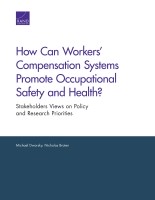| 来源类型 | Research Reports
|
| 规范类型 | 报告
|
| DOI | https://doi.org/10.7249/RR2566
|
| ISBN | 9781977401519
|
| 来源ID | RR-2566-NIOSH
|
| How Can Workers' Compensation Systems Promote Occupational Safety and Health? Stakeholder Views on Policy and Research Priorities |
| Michael Dworsky; Nicholas Broten
|
| 发表日期 | 2018
|
| 出版年 | 2018
|
| 页码 | 116
|
| 语种 | 英语
|
| 结论 |
Published critiques identified numerous problems with current workers' compensation policy.- Coverage remains less than universal, and benefit adequacy is insufficient.
- Problems remain in disability determination and medical treatment.
- Challenges remain in vocational rehabilitation and return to work.
- Safety promotion practices have been somewhat successful but create complex claiming incentives.
- System complexity is a drag on performance.
Stakeholders identified many shortcomings of workers' compensation policy as important challenges to worker outcomes.- New approaches to injury prevention and disability management are needed.
- Declining coverage of workers and health conditions prevents workers' compensation from serving its purposes.
- Inefficient claim management and dispute resolution processes harm workers and drive up costs.
- Health care for injured workers is often fragmented and of low quality and is not designed to reward worker outcomes.
Policy priorities and research needs suggest a two-pronged research agenda for improving workers' compensation policy.- Stakeholders attached a high priority to development of new models and interventions for health care delivery, injury prevention, dispute resolution, and disability prevention.
- Scientific evidence on causation is badly needed to guide workers' compensation systems in handling occupational disease and preexisting conditions.
|
| 摘要 |
- State policy experimentation in workers' compensation should be encouraged in part by federal investments and support for rigorous, independent evaluations. NIOSH and other research agencies should produce a wide range of more basic scientific, economic, and other social-scientific evidence on questions pertaining to epidemiology, system performance, and financing.
- Many important questions, particularly those related to causation, apportionment, and occupational disease presumptions, will generally require observational study and epidemiological methods. Research efforts should be guided by explicit theories of employment outcomes, disability progression, employer decisionmaking, and other relevant behaviors.
- Policy development should be informed by conceptual frameworks that enable quantitative tradeoffs between competing social objectives. Certain policy challenges that might be amenable to fundamental reforms or entirely new insurance arrangements should be an occasion for policy analysts to develop more detailed policy proposals.
|
| 主题 | Occupational Health and Safety
; Workers' Compensation
; Workplace Injury Prevention
|
| URL | https://www.rand.org/pubs/research_reports/RR2566.html
|
| 来源智库 | RAND Corporation (United States)
|
| 引用统计 |
|
| 资源类型 | 智库出版物
|
| 条目标识符 | http://119.78.100.153/handle/2XGU8XDN/108875
|
推荐引用方式
GB/T 7714 |
Michael Dworsky,Nicholas Broten. How Can Workers' Compensation Systems Promote Occupational Safety and Health? Stakeholder Views on Policy and Research Priorities. 2018.
|
|
文件名:
|
x1540239178928.jpg
|
|
格式:
|
JPEG
|

|
文件名:
|
RAND_RR2566.pdf
|
|
格式:
|
Adobe PDF
|
除非特别说明,本系统中所有内容都受版权保护,并保留所有权利。